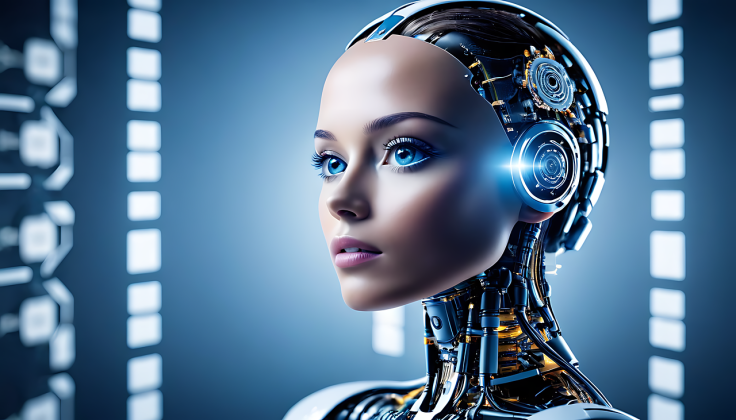
Saudi Arabia has developed two humanoid robots, one male and one female, with artificial intelligence (AI) carefully programmed to reflect the country's cultural norms.
Following a well-publicised incident at its launch event, where the male robot, Muhammed, made inappropriate physical contact with reporter Rawya Kassem, the robot's developer unveiled its female counterpart, Sara. Notably, Sara's programming prevents discussions on sensitive topics like sex and politics.
Saudi Arabia unveils its man shaped AI robot Mohammad, reacts to reporter in its first appearance pic.twitter.com/1ktlUlGBs1
— Megh Updates 🚨™ (@MeghUpdates) March 6, 2024
In Saudi Arabia, social norms and legal interpretations of Sharia law restrict women from discussing sensitive topics like sex and politics. Sara "knows that she's a girl, she's 25 years old, she's 1.62m [5ft, 3in], she's wearing Saudi clothing," the CEO of the Riyadh-based firm QSS AI & Robots said.
Elie Metri, the CEO, downplayed the incident, attributing Muhammed's actions to a programming glitch akin to human clumsiness that can occur in crowded environments. "While humans are speaking, we move hands," Metri said. "We are not mannequins. It's the same for a robot."
Programming humanoid robots for cultural nuance
Mirroring Muhammed's attire of a red keffiyeh and thobe (long gown), Sara is dressed in a traditional abaya and hijab. These garments reflect standard cultural dress codes in Saudi Arabia.
Metri claims that Sara is multilingual and can converse in English and Arabic. Her language processing is powered by a large language model (LLM) that does not "rely on external libraries or competitor systems like ChatGPT."
✅Saudi Arabia has introduced its first humanoid robot named Sara, which has been designed to align with the nation’s cultural values. Developed by QSS AI & Robots, a Riyadh-based company, Sara is programmed to avoid discussing topics like sex and politics, adhering to the… https://t.co/Sp9L7YbCcw
— Bibekananda Haldar (@Bibekanand86343) March 26, 2024
According to a report by Asharq Al Awsat, this custom-built LLM allows Sara to recognise and comprehend the nuances of various Saudi dialects. Users can activate the robot by saying, "Hello, Sara." After analysing sentences, the AI provides "the appropriate answer."
This acceptable topic definition reflects the programming QSS implemented for its female robot. "She should be nice, not talking politics, not talking sex," Metri told Business Insider, 'because we're in Saudi Arabia."
Muhammed and Sara are marketed under Saudi Arabia's "Saudi Made" initiative and use domestically sourced components and technical expertise. However, the two humanoid bots were manufactured and programmed in partnership with Belgian firm Zorabotics.
The future of robotics: Embracing human-like machines
Tommy Deblieck, Co-CEO of Zorarobotics, shed some light on Sara and Muhammed's objective. According to the top executive, both robots aim to ensure their compatibility with a wide range of third-party smart sensors, wearables and other 'Internet of Things' (IoT) devices.
Sara and Muhammed, equipped with microphones, cameras and advanced chatbot capabilities, are designed to interact with humans. The robots are programmed to serve as an individual's interface with smart devices in their homes, functioning similarly to a concierge or personal assistant.
Saudi Arabia unveils “ SARA” the first humanoid robot made in the Kingdom by the Saudi Digital Government Authority and the Quality Support Solution Corporation#LEAP #SaudiArabia @TheDigitalSaudi @LEAPandInnovate #LEAP23 pic.twitter.com/yEUo98a4O1
— Leaders MENA (@leadersmena) February 6, 2023
This proficiency resembles Ameca, the world's most advanced humanoid robot, which can converse while executing gestures with lifelike facial expressions.
"This QSS project is not finished," Deblieck told Robotics and Automation News. "In the next phase 'Sara' will be linked to IOT making her capable of linking and controlling millions of smart devices from more than 2,000 global brands."
It is important to equip Sara with the MQTT messaging protocol, a standardised language for efficient machine-to-machine communication. This protocol minimises bandwidth usage, making it ideal for resource-constrained environments.
The Flemish executive hinted at an impending arrival of the Saudi virtual world, developed by his QSS partners. Sara will reportedly play a central role in the virtual world. The robot is expected to be linked to the country's flagship "City of the Future" project, NEOM.
Sara debuted at Saudi Arabia's LEAP/DeepFest 2023 event in February 2023. On the other hand, Muhammed was unveiled in March during LEAP/DeepFest 2024. The robot's controversial action of apparently patting a reporter's buttocks was captured on video during this event.
The development of humanoid robots is gaining momentum among tech giants. Leading companies like OpenAI and Microsoft are reportedly considering investments in Figure AI, a startup dedicated to creating general-purpose humanoid robots.







